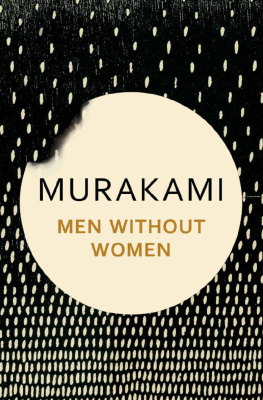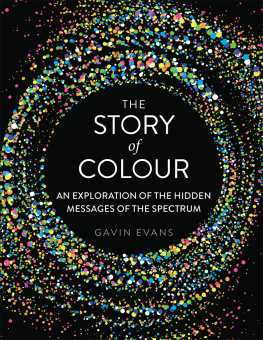Haruki Murakami
COLORLESS TSUKURU TAZAKI AND HIS YEARS OF PILGRIMAGE
Translated from the Japanese by Philip Gabriel






1

From July of his sophomore year in college until the following January, all Tsukuru Tazaki could think about was dying. He turned twenty during this time, but this special watershedbecoming an adultmeant nothing. Taking his own life seemed the most natural solution, and even now he couldnt say why he hadnt taken this final step. Crossing that threshold between life and death would have been easier than swallowing down a slick, raw egg.
Perhaps he didnt commit suicide then because he couldnt conceive of a method that fit the pure and intense feelings he had toward death. But method was beside the point. If there had been a door within reach that led straight to death, he wouldnt have hesitated to push it open, without a second thought, as if it were just a part of ordinary life. For better or for worse, though, there was no such door nearby.
I really should have died then, Tsukuru often told himself. Then this world, the one in the here and now, wouldnt exist. It was a captivating, bewitching thought. The present world wouldnt exist, and reality would no longer be real. As far as this world was concerned, he would simply no longer existjust as this world would no longer exist for him.
At the same time, Tsukuru couldnt fathom why he had reached this point, where he was teetering over the precipice. There was an actual event that had led him to this placethis he knew all too wellbut why should death have such a hold over him, enveloping him in its embrace for nearly half a year? Envelopthe word expressed it precisely. Like Jonah in the belly of the whale, Tsukuru had fallen into the bowels of death, one untold day after another, lost in a dark, stagnant void.
It was as if he were sleepwalking through life, as if he had already died but not yet noticed it. When the sun rose, so would Tsukuruhed brush his teeth, throw on whatever clothes were at hand, ride the train to college, and take notes in class. Like a person in a storm desperately grasping at a lamppost, he clung to this daily routine. He only spoke to people when necessary, and after school, he would return to his solitary apartment, sit on the floor, lean back against the wall, and ponder death and the failures of his life. Before him lay a huge, dark abyss that ran straight through to the earths core. All he could see was a thick cloud of nothingness swirling around him; all he could hear was a profound silence squeezing his eardrums.
When he wasnt thinking about death, his mind was blank. It wasnt hard to keep from thinking. He didnt read any newspapers, didnt listen to music, and had no sexual desire to speak of. Events occurring in the outside world were, to him, inconsequential. When he grew tired of his room, he wandered aimlessly around the neighborhood or went to the station, where he sat on a bench and watched the trains arriving and departing, over and over again.
He took a shower every morning, shampooed his hair well, and did the laundry twice a week. Cleanliness was another one of his pillars: laundry, bathing, and teeth brushing. He barely noticed what he ate. He had lunch at the college cafeteria, but other than that, he hardly consumed a decent meal. When he felt hungry he stopped by the local supermarket and bought an apple or some vegetables. Sometimes he ate plain bread, washing it down with milk straight from the carton. When it was time to sleep, hed gulp down a glass of whiskey as if it were a dose of medicine. Luckily he wasnt much of a drinker, and a small dose of alcohol was all it took to send him off to sleep. He never dreamed. But even if he had dreamed, even if dreamlike images arose from the edges of his mind, they would have found nowhere to perch on the slippery slopes of his consciousness, instead quickly sliding off, down into the void.
The reason why death had such a hold on Tsukuru Tazaki was clear. One day his four closest friends, the friends hed known for a long time, announced that they did not want to see him, or talk with him, ever again. It was a sudden, decisive declaration, with no room for compromise. They gave no explanation, not a word, for this harsh pronouncement. And Tsukuru didnt dare ask.
Hed been friends with the four of them since high school, though when they cut him off, Tsukuru had already left his hometown and was attending college in Tokyo. So being banished didnt have any immediate negative effects on his daily routineit wasnt like there would be awkward moments when hed run into them on the street. But that was just quibbling. The pain he felt was, if anything, more intense, and weighed down on him even more greatly because of the physical distance. Alienation and loneliness became a cable that stretched hundreds of miles long, pulled to the breaking point by a gigantic winch. And through that taut line, day and night, he received indecipherable messages. Like a gale blowing between trees, those messages varied in strength as they reached him in fragments, stinging his ears.
The five of them had been classmates at a public high school in the suburbs of Nagoya. Three boys, and two girls. During summer vacation of their freshman year, they all did some volunteer work together and became friends. Even after freshman year, when they were in different classes, they remained a close-knit group. The volunteer work that had brought them together had been part of a social studies summer assignment, but even after it ended, they chose to volunteer as a group.
Besides the volunteer work, they went hiking together on holidays, played tennis, swam at the Chita Peninsula, or got together at one of their houses to study for tests. Or elseand this was what they did most oftenthey just hung out someplace, and talked for hours. It wasnt like they showed up with a topic in mindthey just never ran out of things to talk about.
Pure chance had brought them together. There were several volunteer opportunities they could have chosen from, but the one they all chose, independently, was an after-school tutoring program for elementary school kids (most of whom were children who refused to go to school). The program was run by a Catholic church, and of the thirty-five students in their high school class, the five of them were the only ones who selected it. To start, they participated in a three-day summer camp outside Nagoya, and got to be good friends with the children.
Whenever they took a break, the five of them gathered to talk. They got to know each other better, sharing their ideas and opening up about their dreams, as well as their problems. And when the summer camp was over, each one of them felt they were in the right place, where they needed to be, with the perfect companions. A unique sense of harmony developed between themeach one needed the other four and, in turn, shared the sense that they too were needed. The whole convergence was like a lucky but entirely accidental chemical fusion, something that could only happen once. You might gather the same materials and make identical preparations, but you would never be able to duplicate the result.



















